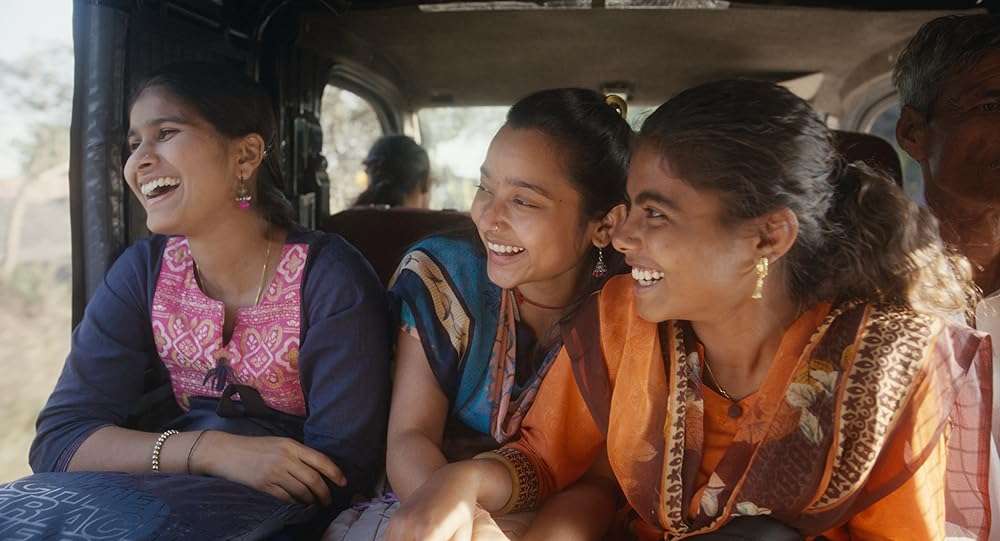In A Match (2023, Original title: Sthal), Savita opens her eyes immediately upon hearing her mom’s wake-up call. She glances at the walls of her room and stares. Her unceasing stare immobilizes her in and out, almost turning her into a figurine in that second. What’s certain is that an enormous amount of strength is pumped and loaded within her soul while she hibernates silently.
The beauty of Jayant Digambar Somalkar’s debut Marathi indie film, Sthal (2023), is just priceless. It starts with a peculiar yet satisfying aphorism of match compatibility sessions from the perspective of brides. The reverse theory is added to replace brides with grooms, where men are placed in the candidate “interview” session. The reflective screenplay of looking at the match session from the other side generally explains the inner frustration of Indian brides, including Savita herself. Savita comes from an orthodox family. They intend to get her married as soon as possible.
Savita is perhaps a princess exiled from the relationship kingdom due to multiple rejections. However, Savita doesn’t seem to be as motivated as her parents due to her personal goal of completing her education. She accepts the match-finding session as part of her parent’s agenda and respects their decision-making. Yet, external factors and perceptions follow Savita’s bumpy voyage of fulfilling wishes and facing oppression.
Multiple social aspects are covered in Sthal, including the questionable mechanism behind the Indian bride and groom alliance session. The session starts with the groom’s family visiting the prospective bride’s home within a given time. The groom’s family cleanses themselves by washing their feet. The session then continues with a series of snacks and tidbits offered by the bride’s family to entertain the groom’s family, who are waiting to see the bride. Next, the prospective bride is seated on a chair for the ultimate interview session.
It’s part of Indian culture for the groom’s family to ask the bride a series of questions for assurance and to prevent exogamy. The repetitive template of questions covering brides’ basic profile has been a guidebook for Indian families for centuries. Sthal presses this issue and pins it as a massive hurdle for brides due to some of the ludicrously futile questions and perceptions. Questioning height and subject majors in education seem outdated and pointless as a decision-making criterion for grooms to select brides.
In addition to this, the physical appearance of women is also judged as part of the compatibility checker for men. There is a scene in the film where a prospective groom’s family judges Savita based on her height and skin tone. The family discusses privately and decides to reject Savita based on these elements, which points directly to inherent prejudice and bias.
The phrase ‘ A Perfect Match ’ here does not follow the circle of understanding and connection but goes right into peer pressure. Savita is attacked continuously from all directions through this context. Her parents’ biggest concern is Savita’s relationship status more than her line of education. This is evident from the choice made by her parents for Savita to attend an alliance session on the day of a very important examination.

The phrase “Your whole life will be a waste if you don’t attend it” by Savita’s mother during a heated argument shows the emphasis on fixing marriages by conservative parents. Savita decides to skip her examination due to the continuous pressure. External connections are also part of the pressurizing group as well, which is a common practice among relatives. Connections recommending prospective grooms to Savita’s parents through word of mouth during a wedding ceremony might sound optimistic. However, a recommendation of a drunkard for Savita exposes the habit of baseless suggestions for proposals. An occasion that should bring a form of joy for Savita towards her friend turns sour instantly.
Meanwhile, the ensemble performances are fascinating and deserve a standing ovation for their contributions to the film. Savita, played by Nandini Chikte, and Daulatrao (Savita’s father), played by Taranath Khiratkar, have brought justice to the emotions explored in the narrative. The sorrow that eats Daulatrao while watching his daughter getting rejected is spoken through the language of his watery eyes. On the other hand, Savita expresses her resentment through silence whenever things turn sideways, even in the aspect of attraction. The addition of metaphorical folk songs gives the viewers more insights into the characters of Savita and Daulatrao.
Speaking about attraction, a love bubble is portrayed between Savita and her college teacher, addressed as Khapne Sir. He expresses his interest in Savita through his miniature smile and quick discussions in the public reading room. Yet, Khapne sir is a representative of learned men with a polarizing mindset toward women’s empowerment. We witness him addressing the meaning of true feminism and advocating for women’s rights through his teachings, but he fails to apply them in his personal life.
Within the same framework, director Jayant inserts several questions for the viewers to consider. Why the necessity or knowledge of women empowerment isn’t understood by people of all genders in rural areas? How could a scholar conveniently forget his socio-political learnings when it comes to his personal space? Why is the dowry culture still practiced in an era of transformation? Why are low-income communities, especially farmers, not given the right pathway in terms of funding and allowances?
Sthal, which won the NETPAC Award at TIFF this year, pulls in the audience to offer a detailed outlook of rural Indian brides finding a suitable match. The unending misery of Indian brides is not only present in rural areas but in big cities as well. Physical attributes are mostly taken as first-impression qualities for decision-making, while leadership qualities and achievements are not seen as game-changing points. What’s alarming is the fact that this culture has not changed even in this era where women have progressed extraordinarily. Director Jayant reminds the viewers that progressive thinking is important, even in rural communities, to eliminate patriarchy and negative ideologies about women.
The phrase “Be Educated, Be Organized & Be Agitated” shown in the film shines as a motivational mantra for people from all walks of life to follow. One thing to be reminded – do not wake the sleeping lioness in the kingdom. She is definitely fearless.

![Retrospekt [2018]: ‘TIFF’ Review](https://79468c92.delivery.rocketcdn.me/wp-content/uploads/2018/09/retrospekt_01_highonfilms-768x384.jpg)
![The Woman in the Window [2021]: Netflix Review – Predictable Hitchcockian thriller dwindles while trying to outsmart the viewer](https://79468c92.delivery.rocketcdn.me/wp-content/uploads/2021/05/The-Woman-in-the-Window-highonfilms-768x512.jpg)


![The Deeper You Dig [2019] : ‘Fantasia’ Review – A true indie horror](https://79468c92.delivery.rocketcdn.me/wp-content/uploads/2019/08/The-Deeper-You-Dig-highonfilms-768x535.jpg)
![Our Hospitality [1923] Review – Evoking Poetic Rhythm & Artistry within Slap-Stick Tradition](https://79468c92.delivery.rocketcdn.me/wp-content/uploads/2020/03/Our-Hospitality-1923-768x432.jpeg)